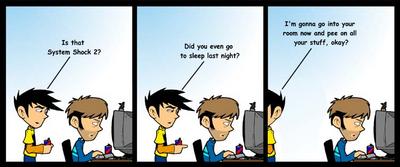trust me, I'm an adult
 This post from jojo had me pondering on freedom.
This post from jojo had me pondering on freedom.Basically the Chinese government has imposed a restriction on the playing of certain online games such that a player will experience serious loss of strength within a game if they play that game for more than 3 hours at one time. After 3 hours they need to take a 5-hour break before they can play again.
Jojo says:
It’s not a massive human rights violation or anything, but it’s certainly something that hits close to home for me and re-enforces my view that the Chinese have a long way to go before their citizens are free. How many of us have played games for more than 3 hours in a stretch on our day off? Read a book a whole evening because it was entralling? Watched an entire day of television when some network is showing a marathon of a show we like?What struck me the most is the paternalistic nature of the restrictions and how this relates to freedoms respected by government in general. For personal freedom to exist (in terms of the law) three things have to be in place. The government (and by extension the people) have to:
1) trust individuals to act in their own best interest;
2) acknowledge that one person cannot decide for another what their best interests are; and
3) know when 1 & 2 should not apply.
But this maybe isn't enough. What if a person fully understands that they're doing something that isn't in their best interests, but chooses to do it anyway. Is that a case where '3' applies?
Mill would have said "no". He would have said that the only time they don't apply is when that person's actions will, if allowed, cause harm to others (harm NOT including moral outrage). The 'Harm Principle' in full states:
...the sole end for which mankind are warranted, individually or collectively, in interfering with the liberty of action of any of their number, is self-protection. That the only purpose for which power can be rightfully exercised over any member of a civilised community, against his will, is to prevent harm to others. His own good, either physical or moral, is not sufficient warrant. He cannot rightfully be compelled to do or forbear because it will be better for him to do so, because it will make him happier, because, in the opinion of others, to do so would be wise, or even right...The only part of the conduct of anyone, for which he is amenable to society, is that whichIt's actually beautifully worded, but for those who don't want to wade through it bit by bit, he's basically saying, 'if they're only hurting themselves, it's their choice, don't force them to stop'. (If anyone is interested to read more of his essay On Liberty, it can be found here.) That doesn't mean we shouldn't give our opinion or plead with them or try to make them 'see sense' if we don't want them to hurt themselves, but we shouldn't coerce them into doing what we, or anyone else, thinks is right. 'Over himself, over his own body and mind, the individual is sovereign.'
concerns others. In the part which merely concerns himself, his independence is, of right, absolute. Over himself, over his own body and mind, the individual is sovereign.
What he would have said though, about when we shouldn't trust a person's choice, is that for a personal choice to be valid a person needs to be:
a) free (not coerced)
b) voluntary (competent to choose) and
c) informed (having sufficient information to choose).
So the only paternalistic laws that Mill might have agreed to are ones that protect the 3 conditions (a, b &c) above. They would be laws that prevent or restrict coercion (eg incest, minimum wage laws, blackmail), involuntariness (eg laws restricting addictive drugs, confinement of the mentally ill) and ignorance (professional licensing, prescription drug laws) (This last section borrows from this site, which summed it up nicely.)
That was extremely philosophical for a Saturday. Still with me?
Back to the Chinese. If someone wants to spend four hours straight playing a video game, what is it that makes the Chinese government deny them the freedom to do so? Is it concern for their health? Worry over their loss in productivity? The idea that games can be addictive? Or does it just sound like too much fun to be legal?


<< Home